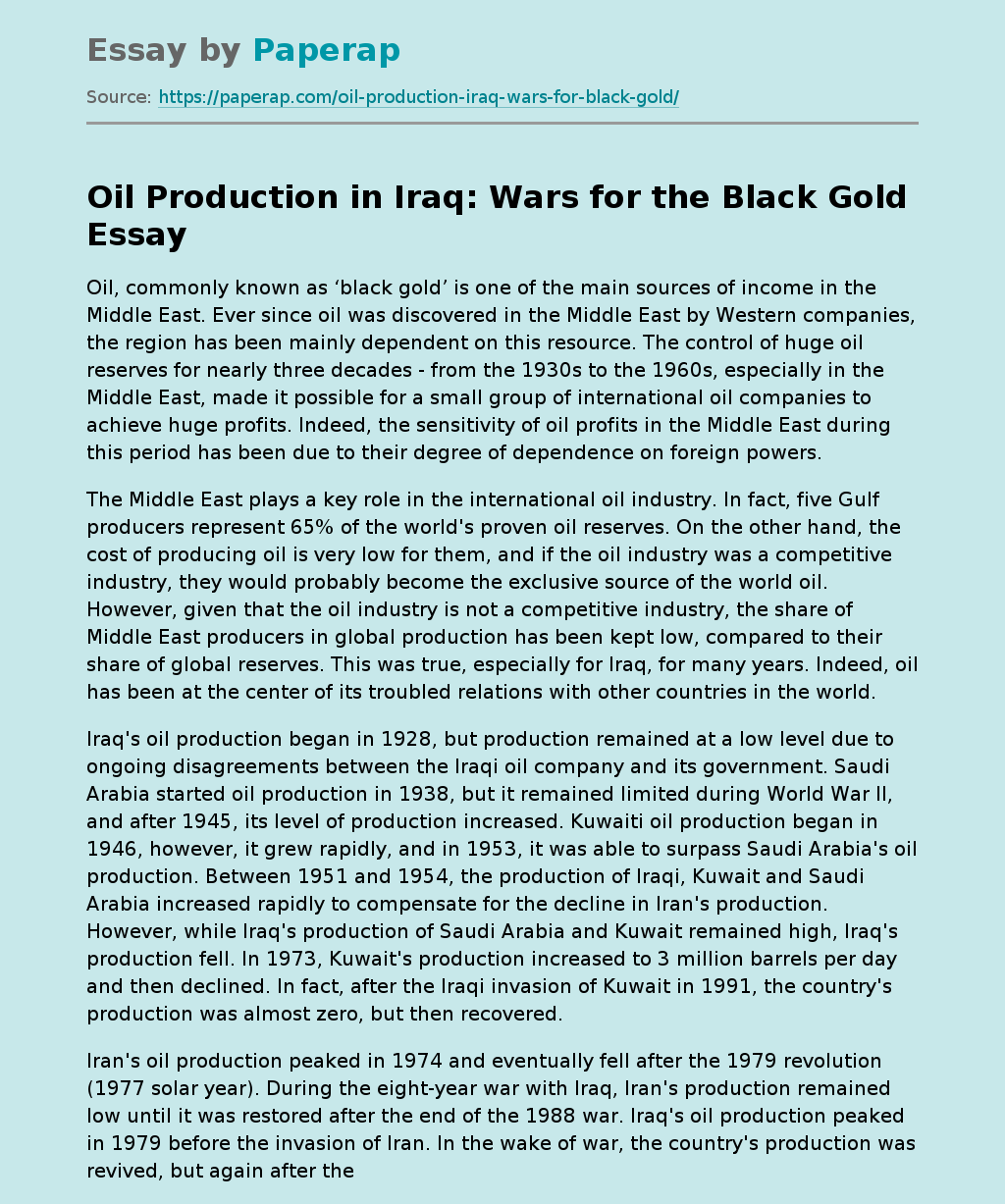Oil Production in Iraq: Wars for the Black Gold
Oil, commonly known as ‘black gold’ is one of the main sources of income in the Middle East. Ever since oil was discovered in the Middle East by Western companies, the region has been mainly dependent on this resource. The control of huge oil reserves for nearly three decades – from the 1930s to the 1960s, especially in the Middle East, made it possible for a small group of international oil companies to achieve huge profits. Indeed, the sensitivity of oil profits in the Middle East during this period has been due to their degree of dependence on foreign powers.
The Middle East plays a key role in the international oil industry. In fact, five Gulf producers represent 65% of the world’s proven oil reserves. On the other hand, the cost of producing oil is very low for them, and if the oil industry was a competitive industry, they would probably become the exclusive source of the world oil. However, given that the oil industry is not a competitive industry, the share of Middle East producers in global production has been kept low, compared to their share of global reserves.
This was true, especially for Iraq, for many years. Indeed, oil has been at the center of its troubled relations with other countries in the world.
Iraq’s oil production began in 1928, but production remained at a low level due to ongoing disagreements between the Iraqi oil company and its government. Saudi Arabia started oil production in 1938, but it remained limited during World War II, and after 1945, its level of production increased.
Kuwaiti oil production began in 1946, however, it grew rapidly, and in 1953, it was able to surpass Saudi Arabia’s oil production. Between 1951 and 1954, the production of Iraqi, Kuwait and Saudi Arabia increased rapidly to compensate for the decline in Iran’s production. However, while Iraq’s production of Saudi Arabia and Kuwait remained high, Iraq’s production fell. In 1973, Kuwait’s production increased to 3 million barrels per day and then declined. In fact, after the Iraqi invasion of Kuwait in 1991, the country’s production was almost zero, but then recovered.
Iran’s oil production peaked in 1974 and eventually fell after the 1979 revolution (1977 solar year). During the eight-year war with Iraq, Iran’s production remained low until it was restored after the end of the 1988 war. Iraq’s oil production peaked in 1979 before the invasion of Iran. In the wake of war, the country’s production was revived, but again after the start of the war with Kuwait in 1990, it fell. Although the country’s production was once again boosted by the United Nations Food Program on Oil, it was stopped again in 2003, with the United States and its allies invading Iraq and occupying the country.
The use of oil resources in Middle Eastern countries, began when its economy was still in the traditional period before industrialization and exploitation, so the incentive to explore and exploit these resources could not have come from domestic demand. The benefits of oil has led to many changes from structural changes in the state budget to the establishment of service institutions, government investments in the construction of ports and other public sectors, the transition from the agricultural and peasant community, rural population escape, the formation of cities, the transition from peasant society to urban society and finally industrial model and energy consumption.
Natural resources such as oil have become commodities in the capitalist system and are in fact defined as capital. This was evident in 1996 during the Oil-For-Food program started by the UN Security Council. The main aim of this program was to enable Iraq to sell their oil resources so as to acquire food and other basic necessities for their population. Iraq was forced to take such steps due to the strict sanctions imposed on them.
Oil has been a key resource for Middle Eastern countries ever since its discovery in the region. Its discovery has shaped the region significantly politically, economically and socially. The region has become one of the wealthiest in the whole world and has transformed into an urban society. However, the discovery of oil has also had negative impacts in the region which include conflicts. The over-dependence of oil in Middle Eastern countries is becoming more evident today and most of the countries in the region are looking for alternative solutions to sustain their respective economies.
Oil Production in Iraq: Wars for the Black Gold. (2021, Dec 13). Retrieved from https://paperap.com/oil-production-iraq-wars-for-black-gold/

